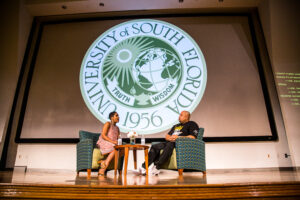Social media’s impact on injustice

Many students feel like there is little they can do to make an impact on our politics. Raymond Santana, in his University Lecture Speech on Tuesday, made it a point to tell the students in attendance that using their voice on social media and in their communities can make large-scale societal change.
Santana was one of five young men falsely accused of a violent act in New York City in 1989. Santana told his heart-wrenching story of spending nearly six years in prison for a crime he did not commit. His life story was recently portrayed in the Netflix drama, “When They See Us.”
Santana made clear throughout his speech that an online political movement is what made all the difference in the outcome of his civil lawsuit against New York City.
Students who want to see a difference in the criminal justice system need to learn and take part in activism online and in their communities.
When discussing criminal justice reform and the prison-industrial complex, it is easy for activists to be discouraged in the fight to reform the system. However, the story of the now Exonerated Five, is proof that social movements have the potential to make huge significant changes in the system.
He explained that the political pressure from social media affected the now mayor, Bill DeBlasio (NY-D), so much that even DeBlasio’s son was pushing for justice for the Central Park Five.
This strategy was all-important because the Exonerated Five’s movement was up against a huge media apparatus that continued to push the narrative that they were guilty.
“Social media is a tool that you guys have that we didn’t have back then, we just relied on the four major newspapers in New York, which you see in the series which wrote the most outrageous headlines,” Santana said.
The Exonerated Five movement is just one example of many ongoing efforts to positively impact our criminal justice system. One reform that was born through online political movements was the elections of “reform-minded prosecutors” that have been supported by Real Justice PAC, a group co-founded by civil rights activist Shaun King.
Overall, the group has elected eight district attorneys and prosecutors all around the country. These changes in leadership make a big difference for reform, and the group started through online political activism.
It is common for activists around the country to believe that pushing political pressure, either online or otherwise, does not create results.
Florida has recently taken small steps toward criminal justice reform. Just this year, Governor Ron DeSantis signed a bill into law that will give state attorneys the power to decide whether certain juvenile criminal cases should be transferred to adult criminal court or not. This has the potential to keep children from being tried as adults.
Every student who feels discouraged by the lack of change in our political system should understand that they are the change. What may initially start out as a movement online can turn into real systemic change in the criminal justice system.
Jared Sellick is a junior majoring in political science.







